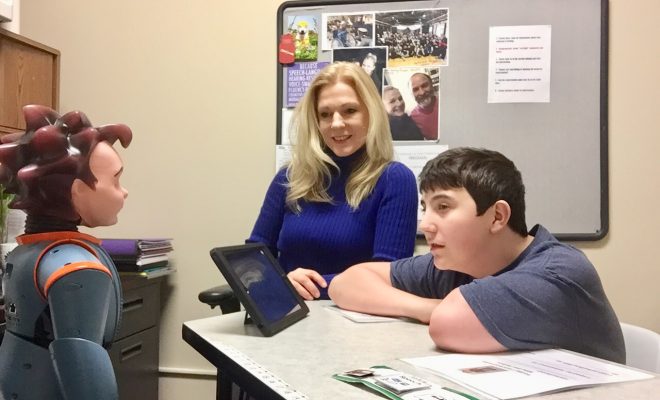How Students with ASD Learn Social Skills from a Robot

A speech-language pathologist shares how she collaborates with a two-foot-tall humanoid named Milo to help students with autism become more attentive and engaged in discussion.
By Jean Graham
Many people may not know that autism spectrum disorder (ASD) is the fastest-growing developmental disability in the U.S. One in 45 children ages 3–17 are currently living with ASD. But how does this affect our classrooms?
As a speech-language pathologist at Broome-Tioga BOCES in New York, I work closely every day with about 24 students who have ASD. With a growing program at BOCES, we decided to pilot Milo, a robot equipped to help students with ASD develop stronger communication and social skills, to work along with our current instruction and therapy. Milo walks, talks, and demonstrates human facial expressions on his own face as well as through videos on an accompanying iPad. Through the curriculum that comes with Milo, students learn to recognize facial expressions, how to greet people appropriately, and how to navigate social situations such as birthday parties. While my district only just started using Milo last fall, we have already seen students with ASD benefitting in a variety of ways.
Decreasing Tantrums and Meltdowns
Ultimately, Milo has given these students the power of control. Those with ASD tend to have meltdowns (dysregulations) and tantrums, which in turn cause a loss of control. While the two may sound similar, they actually have distinct causes and effects.
The reason for a meltdown could be any sort of overload, whether it be sensory, information, or emotional. A tantrum, on the other hand, is said to mean the child is trying to get something, whether that be a toy or attention. Once they receive what they want, the tantrum often resolves itself. With a meltdown, the disruptive behavior may continue even after the child gets their way. It’s considered a “storm that needs to blow itself out.”
Regardless of whether the child has a meltdown or tantrum, the foundation of the problem is that they have lost control. With Milo, students have been able to regain that control and bring themselves back to a sense of awareness of their surroundings. They have a clear idea of what is happening in the lesson when following along with the iPad, giving them the reassurance of knowing exactly what to expect.
Those with ASD can also struggle when interacting with other people, including people their own age. With Milo, you see a connection and shared experience with each interaction. Milo also plays games like Follow the Leader or Red Light, Green Light, which provide children a say in the relationship. They can direct their learning path, even if only for a few minutes.
There is no doubt that using Milo is a learning process. Having a schedule and providing structure for my students has helped them along the way. Using Milo has allowed them to hone in on joint attention, shared experience, interacting, and sharing with other people—ultimately allowing them more time to learn.
One student in particular began to display observable growth in these skills after meeting Milo just one time.
Jake Meets Milo
Typically, Milo works with students ages 5–17, so Jake, at 14, presented a challenge that younger students don’t. Because of Jake’s age, his behaviors were a little more ingrained than younger students’. When we first started our group sessions together, it was difficult to get him to focus and engage in group discussions. He was easily overwhelmed and lost attention quickly.
The first time Jake and Milo met, Jake came into my classroom and the robot was set up on the table, with Milo at eye level and a safe space between the two. He was very intrigued by Milo’s presence when first meeting him. Jake tends to self-talk, stim, and turn his center away from the group. But with Milo, he is completely engaged, with a significant decrease in self-talk or overt stimming behaviors. He speaks about Milo as if he is a friend and greets him by saying, “Hi, Milo.”
In his lessons with Milo, Jake can watch symbols displayed on Milo’s chest screen that help him better understand what he is saying. During these lessons, Milo has Jake watch short clips (about 4–5 seconds) that demonstrate various social behaviors. Milo then asks Jake questions to determine if the learners in the video are demonstrating the behaviors correctly.
The first session was intended for Jake to familiarize himself with Milo. We made it a priority to focus on the Calm Down module, which teaches kids with ASD how to calm themselves down when they are feeling overstimulated. This helps prevents tantrums and meltdowns by presenting tactics such as having the child take a deep breath, squeeze a stress ball, or simply count to 10.
When Jake came back for his second time around, he demonstrated that he had nearly memorized the first lesson. When Milo asked a question, Jake picked the correct icon from the Calm Down tools choice board before Milo had read the options out loud. This choice board was created to have available during moments when the student needed to refer to the strategies outside of a structured setting with Milo. Jake has also generalized the greetings that Milo has taught him, and uses them in his own life with others.
The benefit of using technology like Milo and the robots4autism curriculum is the flexibility it allows when working with students who may fall anywhere along the autism spectrum. After all, when you meet someone with autism, you meet one individual with autism. Each story is different, but every one of these kids are incredible students who want to learn.
Jean Graham is a speech-language pathologist at Broome-Tioga BOCES in Broome County, New York.





